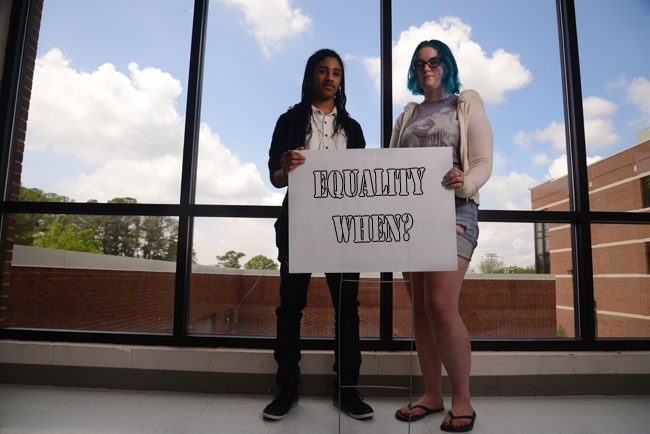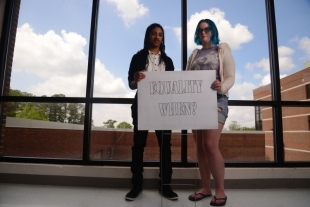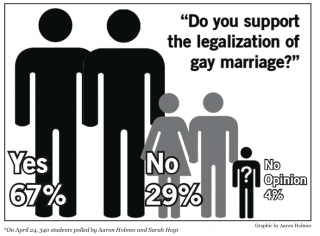By AARON HOLMES – News Editor
As the Supreme Court draws closer to a ruling on the constitutionality of same-sex marriage, the Clarke Central High School Gay-Straight Alliance works towards tolerance within the school.
Last month, the Supreme Court heard the oral arguments of a case in which the constitutionality of same-sex marriage was debated. The case centered around Section 3 of the Defense of Marriage Act, a bill signed into law in 1996 that defines legal marriage as between a man and a woman.
Many students like juniors Gregg Guichard and Audrey Spiers believe in rights for same-sex couples locally and nationwide. “In my opinion, gay marriage should be a right,” Guichard said.
Although the Supreme Court is not expected to rule on the case until June, discussion of same-sex marriage increased throughout the U.S., including in Athens.
“Obviously I think (same-sex marriage) should be legalized,” junior Audrey Spiers said. “Our religious beliefs cannot affect the government, legally. Marriage should be between two people who love each other.”
However, some students expressed that they do not support the legalization of gay marriage. In most cases, this position was influenced by religion.
“I don’t believe in that; it’s just not a part of my religion,” junior Mikayla Stapleton said.
Spiers, who is the president of the Clarke Central High School Gay-Straight Alliance, considers herself an advocate for lesbian, gay, bisexual, transgender and queer students at CCHS. She also acknowledges that homosexuality is often a burden for closeted students.
“People do talk in high school. People gossip, people make assumptions and things get out,” Spiers said. “If someone says, ‘I’m gay,’ and that gets out to their parents, they can possibly be homeless. It’s a serious issue.”
According to Spiers, although students are not vocally anti-LGBTQ, hateful speech and name calling are still common at school, and are a burden to LGBTQ students.
“I think people, in general, are accepting, but that doesn’t stop hateful language or stereotypes. It doesn’t stop bullying,” Spiers said. “You still hear lots of phrases in the hallways. Even if it’s something little like, ‘That’s gay,’ that uses the word ‘gay’ in a negative connotation, it makes people who are gay feel like it’s something negative.”
Spiers explains that GSA provides a confidential and supportive environment for students of all sexual orientations.
“It provides a safe place where you can talk about anything and you know no one’s going to tell,” Spiers said. “Our biggest rule is, ‘whatever is said in the club stays in the club.’”
Counselor and GSA sponsor Lenore Katz says that her interest in the GSA stemmed from a general interest in students’ well-being.
“GSA is student-initiated: there were students who just came to me, and I guess I’ve always had an interest as a counselor to hear things from students I know,” Katz said. “And there are (LGBTQ) students who are at risk because they don’t feel safe, or who can’t succeed.”
As Katz sees it, GSA not only provides an outlet for students seeking confidentiality, but also aims to hold a beneficial presence in the greater Athens community.
“We have students of every sexual orientation, and they need a place where they feel comfortable. It’s also just like any other club in that it involves socializing and community service,” Katz said. “In that way it’s just one more club where kids can share common interests and get together.”
As a counselor, Katz also interacts with students on a personal level who feel uncomfortable at school because of their sexuality. According to Katz, these meetings typically yield favorable results.
“Students refer themselves (to me), teachers refer students and parents may refer students. It’s a place where they can feel comfortable to discuss the issues that surround sexual orientation,” Katz said. “Teachers ask us to come in to a class to facilitate a discussion if the teacher has been hearing name-calling or hateful language. It’s about getting everybody on the same page.”
Regardless of such events, Katz feels that CCHS is, for the most part, an accepting environment for LGBTQ students, despite her heightened standards for the school.
“No place is perfect, and I have very high standards for what I’d like us to look like,” Katz said. “But I can’t think of a time when something has come to our attention that hasn’t been addressed. We speak to students. We do not look the other way.”
Principal Dr. Robbie P. Hooker also feels that CCHS, as compared to other high schools, provides significant support for LGBTQ students.
“We’re probably more accepting than most of the surrounding high schools. To embrace a Gay-Straight Alliance at a high school level is very unusual,” Hooker said. “And we have some students who attend our (GSA) meetings from other counties.”
While Spiers acknowledges the effort made by the staff to ensure a safe environment, in her experience, bullying is usually in the form of offhand remarks. She explains that such casual remarks are worsened by teachers who choose to ignore them.
“If they see it in their classroom, the teachers might say, ‘Be quiet,’ but they won’t address the issue,” Spiers said. “There have even been a few cases where teachers have said something that makes the student feel uncomfortable about their sexual orientation.”
Junior Gregg Guichard says that, while he believes CCHS to be an accepting environment, he has been bullied based on his sexual orientation.
“In the classrooms, there have been a lot of times when kids will say the word ‘faggot’ out loud and teachers just ignore it. But when they say other cuss words, the teachers react,” Guichard said.
According to Spiers, instances like these led the GSA to organize an annual school-wide anti-bullying petition signed by teachers and students.
“We have students sign that they won’t bully people based on their race, sexual orientation, gender, ethnicity or religion and teachers sign a petition saying that they will not allow for that kind of bullying in their classrooms,” Spiers said. “The main issue in our club is that every teacher needs to make their classroom a comfortable environment where everyone can learn.”
Katz said that teachers should also undergo a “sensitivity training” to be better prepared to address bullying and insensitive speech in their classroom.
“I would like that every teacher go through a training so they know how to deal with these issues,” Katz said. “It’s just raising sensitivity, treating every kid with respect especially if you don’t know everything about that kid. So that everyone can be safe and learn, and go on with their lives.”
Spiers believes that CCHS, along with the rest of society, has made strides toward tolerance.
“If you look at the past, we’ve had the same types of issues with different prejudices, like racism and women’s rights. We’re making that progress now, where homosexuality is becoming more of an out-in-the-open-type thing,” Spiers said. “People have a fear of the unknown, and when you start to learn more about something, you’ll be more comfortable with it.”
However, in the future, she hopes to see not only improvements in the treatment of those who identify as homosexual, but also in the treatment of people with other sexual preferences.
“But we aren’t making a lot of progress on other issues, like transgender issues and asexual people. All these people have so many different orientations and gender identities that need to be addressed,” Spiers said. “Gay marriage is just the start.”


